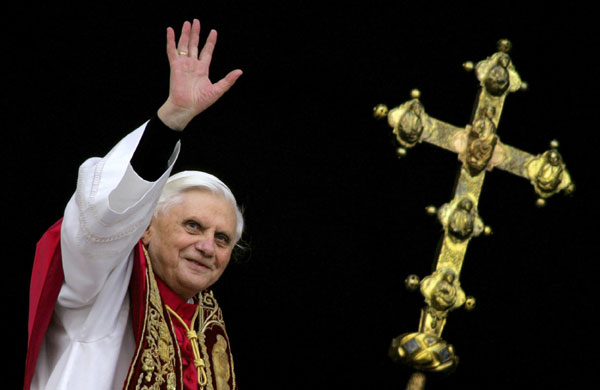Catholics rocked by Pope's resignation
|
 Pope Benedict XVI waves from a balcony of St. Peter's Basilica in April 2005, after being elected pope at the age of 78. Reuters file photo |
Pope Benedict left the Catholic world in shock after becoming the first pontiff since the Middle Ages to resign his office, saying that failing strength had left him unable to lead the church through a period of relentless change and turmoil.
The 85-year-old pontiff announced his abdication as leader of the world's 1.2 billion Catholics in a speech delivered in Latin, the universal language of the church, to cardinals meeting in the Vatican's Apostolic Palace on Monday.
The closest of confidants, Cardinal Joseph Ratzinger had watched from the front row as Pope John Paul II, once a strapping athlete, steadily deteriorated in his later years.
John Paul, burdened by Parkinson's disease and crippling hip ailments, could no longer walk or talk at the time of his death in 2005 at 84 - a picture of suffering that moved the faithful while presenting a disturbing vision of papal frailty. The physical ordeal also left John Paul distracted from the challenges the church was facing, including the global priest sex-abuse scandal.
Ratzinger, elected as Pope Benedict XVI, was at 78 the oldest pope in 300 years. An examination of Benedict's thinking makes the decision less of a surprise. In 2004 and 2010 interviews, he took an unambiguous stand on whether a pope could resign.
"Yes. If a pope clearly realizes that he is no longer physically, psychologically and spiritually capable of handling the duties of his office, then he has a right and, under some circumstances, also an obligation to resign," Benedict said in 2010.
The pope's announcement brought reawakened calls for a more energetic successor, perhaps from Africa or Latin America - long considered bulwarks against continued losses in church membership in Europe and the United States. While the church has been battered by growing secularism and sex-abuse scandals in the northern hemisphere, the number of believers is growing in Africa, as well as Latin America.
Benedict will continue in office until Feb 28. Vatican officials said the election of a new pope was expected to come by the start of the church's Holy Week on March 24.
Famously known as "God's Rottweiler" before his election in 2005, Benedict fought against the spread of materialist values in society and strongly opposed any relaxation of the church's traditional strictures against contraception, homosexual acts or women priests.
Israel's Ashkenazi Chief Rabbi Yona Metzger told AFP that Benedict had improved ties between Judaism and Christianity that helped reduce anti-Semitism around the world. "No pope before him visited as many synagogues," World Jewish Congress president Ronald Lauder said in a statement.
His eight years in office were overshadowed by scandals ranging from the sexual abuse of children by priests to the arrest of his own butler for stealing confidential papal documents in the so-called "Vatileaks" affair.
"I deeply respect the decision of Pope Benedict XVI, especially since it is not in line with tradition," said Herman Van Rompuy, president of the European Council and himself a Catholic. "His pontificate has been short but very difficult."
"This pope had a great opportunity to finally address the decades of abuse in the church," said John Kelly, of the Irish Survivors of Child Abuse support group. "But at the end of the day he did nothing but promise everything and in the end, he ultimately delivered nothing."
And the US branch of SNAP said the pope "still has two weeks" to take action against child sex abuse by church staff. "Before he steps down, we hope he will show true leadership and compassion and take tangible action to safeguard vulnerable children."
The last pope to leave office willingly was Celestine V, a saintly hermit who served only a few months before abdicating in December 1294. Another pope, Gregory XII, reluctantly abdicated in 1415 to end a dispute with a rival claimant to the papacy.
Reuters - AP - AFP


















